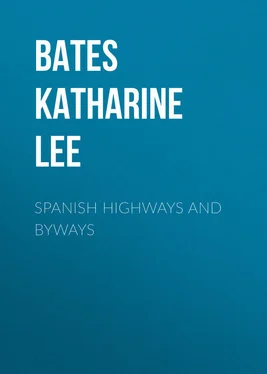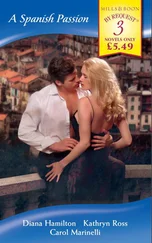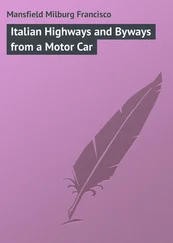Katharine Bates - Spanish Highways and Byways
Здесь есть возможность читать онлайн «Katharine Bates - Spanish Highways and Byways» — ознакомительный отрывок электронной книги совершенно бесплатно, а после прочтения отрывка купить полную версию. В некоторых случаях можно слушать аудио, скачать через торрент в формате fb2 и присутствует краткое содержание. ISBN: , Жанр: foreign_antique, foreign_prose, Путешествия и география, на английском языке. Описание произведения, (предисловие) а так же отзывы посетителей доступны на портале библиотеки ЛибКат.
- Название:Spanish Highways and Byways
- Автор:
- Жанр:
- Год:неизвестен
- ISBN:http://www.gutenberg.org/ebooks/38767
- Рейтинг книги:5 / 5. Голосов: 1
-
Избранное:Добавить в избранное
- Отзывы:
-
Ваша оценка:
- 100
- 1
- 2
- 3
- 4
- 5
Spanish Highways and Byways: краткое содержание, описание и аннотация
Предлагаем к чтению аннотацию, описание, краткое содержание или предисловие (зависит от того, что написал сам автор книги «Spanish Highways and Byways»). Если вы не нашли необходимую информацию о книге — напишите в комментариях, мы постараемся отыскать её.
Spanish Highways and Byways — читать онлайн ознакомительный отрывок
Ниже представлен текст книги, разбитый по страницам. Система сохранения места последней прочитанной страницы, позволяет с удобством читать онлайн бесплатно книгу «Spanish Highways and Byways», без необходимости каждый раз заново искать на чём Вы остановились. Поставьте закладку, и сможете в любой момент перейти на страницу, на которой закончили чтение.
Интервал:
Закладка:
The ancient glory of Spain, he says, has vanished like a dream; let a new and whiter glory dawn. Her career of material conquest is ended. Those savage struggles have left her faint and spent. Let her now seek to attain, through purification and discipline, such fresh fulness of life as shall insure the triumph of her spiritual forces – her fervent faith and her unworldly wisdom. "Our Ulysses is Don Quixote."
V
IN SIGHT OF THE GIRALDA
"We were nearing Seville. I felt the eager throbbing of my heart. Seville had ever been for me the symbol of light, the city of love and joy." – Valdés: La Hermana San Sulpicio .
One of the wise sayings of Andalusia runs, "Do not squeeze the orange till the juice is bitter." And so we said good-by to Granada before we were ready to go, and persuaded ourselves, in defiance of maps and time-tables, that our shortest route to Seville led by Ronda. The weather did its very best to dampen our enthusiasm for this wildest of crag aeries, equally famed for romantic beauty of outlook and salubrity of air. Men live long in Ronda, unless, indeed, they hit against a bullet while practising their hereditary trade of contrabandista . They have a saying that octogenarians there are only chickens, but one should not believe all that they say in Ronda. Did we not clamber, slipping on wet stones, down a precipitous path to peer, from under dripping umbrellas, at what our guide declared was an old Roman bridge? "It doesn't look old and it doesn't look Roman," was the artist's dubious comment, but our highly recommended conductor, a Gib, as the English-Spanish natives of Gibraltar Rock are called, assured us that it was built in the days of Julius Cæsar, but had been wonderfully well preserved. We eyed him thoughtfully, bearing in mind that he had already pointed out the statue of a long-dead poet as a living politician; but we meekly continued through the lashing rain to follow his long footsteps over the breakneck ways of that natural fortress where race after race has left its autograph. The Roman columns of the church make the Arab cupolas look young, and put the Gothic choir altogether out of countenance. A bright-shawled peasant woman, who we fondly hoped might be a smuggler's wife, drew us delicious water from a Roman well in a Moorish patio, where a mediæval king of gentle memory used to drink his wine from cups wrought of the skulls of those enemies whom he had beheaded with his own sword. But not all this, and more, could efface our doubts of that Roman bridge, which, indeed, we found, on a belated perusal of our guide-books, had been erected by a Malaga architect in the last century.
The street rabble of Ronda was the rudest and fiercest we encountered anywhere in Spain. Several times our guide wheeled suddenly to confront some gypsyish lad, creeping up behind us with stone all ready to throw, and when, at a glint of sunset through the stormy clouds, we tried to slip out unattended to the neighboring alameda , with its far-sweeping prospect of folded mountain ranges and its vertical view of gorge and rushing river, the children actually hounded us back to the hotel. Their leader was a scrofulous boy, with one cheek eaten away, who had been taught to press his face so closely upon strangers that, in fear of his open sore, they would hastily give money to keep him back. He was a merry scamp and got a world of sport out of his sickening business, laughing at the top of his voice to see himself "avoided like the sun."
Although the tempest had lulled by evening, Ronda, still inhospitable, would not let us sleep. All up and down the window-grated street sounded, from midnight to morning, a tinkling of guitars. It was, forsooth, St. Joseph's Day, and every Don José, every Doña Josefa, every little Pepe, every pretty Pepita, must be saluted by a serenade. All Andalusians are musical, taking much pleasure, moreover, in one of their own bits of philosophy, "The poorest player has his uses, for he can at least drive the rats out of the house." Rats or no, we left Ronda by the morning train.
Our carriage was crowded with several Spaniards and a "Jew-Gib," who, without saying " oxte ni moxte ," assumed full charge of us and our belongings for the journey. This unceremonious but really helpful escort put every one of his fellow-travellers through a sharp catechism as to birthplace, business, destination, and the like. Our turn came first of all. "You are English?" "We speak English." "Ha!" He fell into our own vernacular. "Came about three thousand miles to Spain?" "Across the channel." He chuckled with prompt appreciation of the situation and mendaciously translated to the carriage at large, "The ladies are distinguished Londoners, on their way to visit relatives in Seville," whereat the Andalusians smiled sleepily upon us and asked permission to smoke. We consented cheerfully, as our Spanish sisters had taught us that we should. "I like it," one pallid señora had said on an earlier trip. "It makes me sick, yes, but men ought to be men."
We were journeying toward the very palace of the sun, with gray ranks of olive trees standing guard on either hand. "And posted among them, like white doves, could be seen now and again a few mills where the bitter olive is wont to pour its juice." Orange plantations and hedges of the bluish aloe, fig trees, palms, and all manner of strange, tropical flowers gladdened our approach to Seville. And when, at last, we saw from afar the world-praised Giralda, the Moorish bell-tower of the cathedral, soaring pink into a purple sky, we felt as if we were really arrived in fairyland.
Our friendly Gib put his tall figure between us and the howling press of swarthy porters and cab-drivers, scolded, expostulated, threatened, picked out his men, beat down their prices, called up a policeman to witness the bargain and take the number of our cab, raised his hat, and vanished into grateful memory.
Six weeks in Seville! And six weeks in a Seville home, where evening after evening the gay youth of Andalusia laughed and sang, danced and rattled the castanets, and cast about our wondering Western souls strange witcheries from which we shall never more go free. It was all as Oriental as a dream. The Sultana of the South lifted her gleaming coronet of domes and pinnacles above such a kingdom of idle, delicious mirth as has permanently unfitted us for considering it important to do our duty. Our hereditary bits of Plymouth Rock were melted up in that fervent heat. Right or wrong? "Where there is music, there can be no harm." True or false?
"In this world, my masters,
There's neither truth nor lie,
But all things take the color
Of the glass before the eye."
Only six weeks, and yet we shall ever go homesick for Seville, for her palm trees and orange gardens, her narrow streets like lanes of shadow, her tiled and statued patios, with caged birds singing answer to the ripple of the fountain, the musical midnight cry of her serenos , "her black and burning eyes like beacons in the dark," her sighing serenaders, "lyrical mosquitoes," outside the grated window or beneath the balcony, her fragrances of rose and jessamine, her poetic sense of values. A homeless Andalusian, dinnerless and in rags, strums on his guitar, a necessity which he would not dream of selling for such a mere luxury as bread, and is happy. There is always sun to sleep in. There are always piquant faces and gliding forms to gaze after. What more does a mortal want? Exquisite Seville! No wonder that her exiled sons still sing, after years of "comfortable living" in foreign cities: —
"When I am missing, hunt me down
In Andalusia's purple light,
Where all the beauties are so brown,
And all the wits so bright."
Yet the old Arabian enchantment casts a glamour which the Anglo-Saxon vision dimly recognizes as such and faintly strives against. To the clear survey all is not charm. Grace, mirth, and music, on the one hand, are offset by ignorance, suffering, and vice on the other. Many evil things were told us, and some ugly things we saw, but to look on Andalusia is to love her, even while realizing that to live with her would put that love to a very stringent test.
Читать дальшеИнтервал:
Закладка:
Похожие книги на «Spanish Highways and Byways»
Представляем Вашему вниманию похожие книги на «Spanish Highways and Byways» списком для выбора. Мы отобрали схожую по названию и смыслу литературу в надежде предоставить читателям больше вариантов отыскать новые, интересные, ещё непрочитанные произведения.
Обсуждение, отзывы о книге «Spanish Highways and Byways» и просто собственные мнения читателей. Оставьте ваши комментарии, напишите, что Вы думаете о произведении, его смысле или главных героях. Укажите что конкретно понравилось, а что нет, и почему Вы так считаете.












